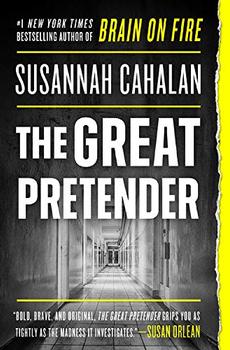Summary | Excerpt | Reading Guide | Reviews | Beyond the Book | Readalikes | Genres & Themes | Author Bio
The Undercover Mission That Changed Our Understanding of Madness

Critics' Opinion:
Readers' Opinion:
First Published:
Nov 2019, 400 pages
Paperback:
Jul 2020, 400 pages
 Book Reviewed by:
Book Reviewed by:
Elisabeth Herschbach
Buy This Book
1
MIRROR IMAGE
Psychiatry, as a distinct branch of medicine, has come far in its short life span. The field has rejected the shameful practices of the recent past—the lobotomies, forced sterilizations, human warehousing. Today's psychiatrists boast a varied arsenal of effective drugs and have largely dropped the unscientific trappings of psychoanalytic psychobabble, the "schizophrenogenic" or "refrigerator" mothers of yesteryear who had been blamed for triggering insanity in their offspring. Two decades into the twenty- first century, psychiatry now recognizes that serious mental illnesses are legitimate brain disorders.
Despite all these advancements, however, the field lags behind the rest of medicine. Most of our major innovations—better drugs, improved therapies—were in play around the time we first walked on the moon. Though the American Psychiatric Association reassures us that psychiatrists are uniquely qualified to "assess both the mental and physical aspects of psychological problems," they are, like all of medicine, limited by the tools at hand. There are not, as of this writing, any consistent objective measures that can render a definitive psychiatric diagnosis—no blood tests to diagnose depression or brain scans to confirm schizophrenia. Psychiatrists instead rely on observed symptoms combined with patient histories and interviews with family and friends to make a diagnosis. Their organ of study is the "mind," the seat of personality, identity, and selfhood, so it should not be surprising that the study of it is more impenetrable than understanding, say, the biology of skin cancer or the mechanics of heart disease.
"Psychiatry has a tough job. In order to get the answers we need, the truth about what's really going on, we need to understand our most complex organ, the brain," said psychiatrist Dr. Michael Meade. "To understand how this physical organ gives rise to the phenomenon of consciousness, of emotion, of motivation, all the complex functions we humans see as possibly distinguishing us from other animals."
Diseases like the one that set my brain "on fire" in 2009 are called the great pretenders because they bridge medical worlds: Their symptoms mimic the behaviors of psychiatric illnesses like schizophrenia or bipolar disorder, but these symptoms have known physical causes, such as autoimmune reactions, infections, or some other detectable dysfunction in the body. Doctors use terms like organic and somatic to describe diseases like mine, whereas psychiatric illnesses are considered inorganic, psychological, or functional. The whole system is based on this distinction, on categorizing illness as one or the other, and it dictates how we treat patients up and down the scale.
So what is mental illness? The question of how to separate sanity from insanity, of how to even define mental illness, rises above semantics, and above deciding what kind of specialist will care for you or your loved one during a time of intense need. The ability to accurately answer this question shapes everything—from how we medicate, treat, insure, and hospitalize to how we police and whom we choose to imprison. When doctors diagnosed me with an organic illness (as in physical, in the body, real) as opposed to a psychiatric one (in the mind, and therefore somehow less real), it meant that I'd receive lifesaving treatment instead of being cordoned off from the rest of medicine. This separation would have delayed or even derailed my medical team's efforts to solve the mystery in my brain and would have likely led to my disablement or death. The stakes couldn't be higher, yet, as psychiatrist Anthony David told me, "the lay public would be horrified to realize how flawed and arbitrary a lot of medical diagnosis is."
Indeed, this "flawed and arbitrary" diagnostic system has life- altering ramifications for the one in five adults living in the United States who will experience symptoms of mental illness this year. It even more urgently affects the 4 percent of Americans who contend with serious mental illness,1 a segment of the population whose lives are often shortened by ten to twenty years. Despite all of our medical progress—of which I'm a direct recipient—the sickest among us are getting sicker.
Excerpted from The Great Pretender: The Undercover Mission That Changed Our Understanding of Madness. Copyright © 2019 by Susannah Cahalan, LLC. Reprinted with permission of Grand Central Publishing. All rights reserved.





The House on Biscayne Bay
by Chanel Cleeton
As death stalks a gothic mansion in Miami, the lives of two women intertwine as the past and present collide.

The Flower Sisters
by Michelle Collins Anderson
From the new Fannie Flagg of the Ozarks, a richly-woven story of family, forgiveness, and reinvention.

The Funeral Cryer by Wenyan Lu
Debut novelist Wenyan Lu brings us this witty yet profound story about one woman's midlife reawakening in contemporary rural China.
Your guide toexceptional books
BookBrowse seeks out and recommends the best in contemporary fiction and nonfiction—books that not only engage and entertain but also deepen our understanding of ourselves and the world around us.